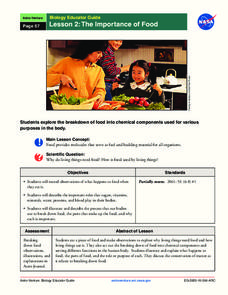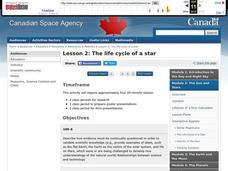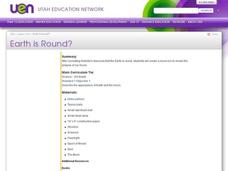Curated OER
Observing and Sketching the Lunar Surface
Students explore space science by conducting an illustration activity. In this lunar lesson, students discuss what the moon is and the role it plays for our environment on Earth. Students view images of the moon and utilize chalk to...
Curated OER
Settlement Exploration: Then and Now
NASA has crafted an imaginative and memorable series of lessons, "NASA and Jamestown Education Module." This activity is one of the five components. In it, middle schoolers connect history and science by comparing the settlement of...
Curated OER
Adopt A Constellation
In this space science worksheet, learners discover and write the name of their favorite constellation. Then they describe the history of it and draw a diagram, labeling the major stars and providing lines to show its shape.
Curated OER
Swinging on a Star
Students explore the issues that might arise if humans were to go on an interstellar space mission. They synthesize their understanding of interstellar travel by writing scenes from a science fiction novel that would depict such a mission.
Curated OER
Planets Worksheet
In this planets activity, students use Internet research to complete 5 pages about solar system facts. Students answer 25 essay questions and label a diagram of the solar system.
Curated OER
The Magic School Bus Out of This World
Students learn along with Ms. Frizzle's class. In this Magic School Bus lesson plan, students explore craters that objects of different sizes and weights (marbles, Ping-Pong balls, and aluminum foil balls) create.
Curated OER
Constellations
Students investigate the concept of the constellations using many different resources to find information. Then students use the information in order to construct models of the constellations that show the magnitude of their size and...
NASA
The Importance of Food
Pupils make observations while eating food. They act out the process of food breaking down in the body and the roles of various chemical components, such as sugar and protein. It concludes with an activity illustrating the process and a...
Curated OER
The Life Cycle of a Star
Students investigate the life cycle of a star and make conclusions based on evidence, research, and observation. In this lesson on space and scientific investigation, students describe the relationships between science and technology...
Curated OER
Canadian Astronauts and Astronomers
Students research the web for Canadian nationals such as Marc Garneau, Roberta Bandar and Chris Hadfield who have contributed to science and technology. For this Astronauts and astronomers lesson, students work in groups and are assigned...
Curated OER
How Do We Explore Strange Environments?
Students identify and label the different parts of a robot, rover, or a spacecraft. They discuss and record all of the features their robot will need to accomplish its mission and be able to explain why they chose these features to...
Curated OER
A Moon with a View
Third graders explore the rotation of Earth and the moon. In this solar system lesson plan, 3rd graders participate in an Earth and moon simulation in which part of the class "becomes" the sun, while other children represent the moon by...
Curated OER
Follow the Sun
Students use a simple model of the Earth and Sun as seen from space to explore the sun's apparent movement across the sky over the course of a day and year. They consider the apparent direction of movement and changes in the sun's angle.
Curated OER
Your Galactic Address
Students discover their place in the universe. In this astronomy lesson, students identify their location on various maps that have increasingly larger scales. In the end, the students write their address in terms of their location in...
Curated OER
Why Do We Have Night?
Students engage in a fun, creative way to discover how the Earth moves. This instructional activity helps students explain why there is day and night. It can also create curiosity to further study the solar system and eclipses!
Curated OER
Starquest
Students study the history and cultural interpretation of a celestial body or constellation. They create technology based presentations of the information.
Curated OER
Modeling the Big Bang and the Formation of the Universe
Sixth graders conduct an experiment to understand the Big Bang Theory. For this Big Bang Theory lesson, 6th graders will observe a balloon with confetti popping to emulate and analyze information related tot he Big Bang theory. Students...
Curated OER
The Reasons for the Season
Students explain the reason for the changes in season. In this lesson examining the relationship between the Earth and the Sun, students use an applet to discover how the alignment of the Earth and the Sun cause the change in seasons.
Curated OER
Sweet Candy Comets
Fourth graders use candy to make a comet. In this instructional activity, 4th graders examine the role comets have played throughout history, students watch NASA videos about comets and complete the instructional activity by making an...
Curated OER
What are Stars?
Young scholars research the solar system and it's characteristics. In this solar system lesson, students are broken into 4 groups, each assigned a specific part of the solar system. Young scholars use the Internet to research their...
Curated OER
Earth is Round?
Third graders discuss how Aristotle concluded that the Earth was round. As a class, they review theories about the Earth's shape and describe how life on Earth would be different if it were flat. Individually, they make a moon book in...






















